The Canary Islands are a popular holiday destination thanks to their great weather and constant proximity to the sea. But what’s living in the Canary Islands like for expats?
In this guide, we’ll cover all the important topics you need to know if you’re considering a life in the Canaries. This includes the cost of living, the best places to settle down, and some tips about buying property.
Are the Canary Islands a good place to live?
The Canary Islands are certainly a good place to live if you want all the benefits of living in Europe but with some isolation from the mainland. The islands have long, hot summers and short, mild winters. Also, there are eight main islands to choose from, giving you plenty of variety.
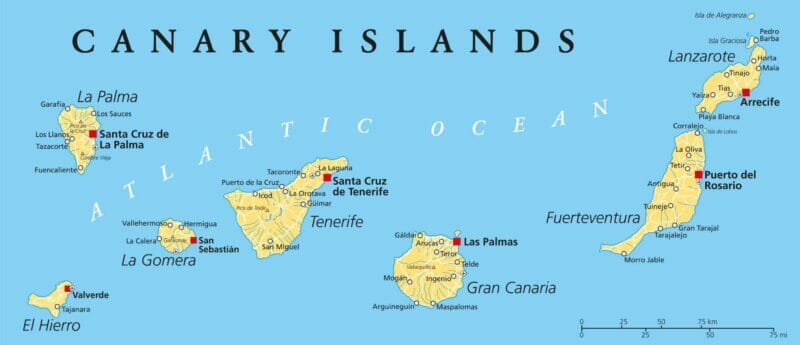
If you’ve ever been on holiday to the Canaries, you’ll be familiar with names like Tenerife, Gran Canaria, and Lanzarote. These are the most popular with tourists, but you also have the likes of La Palma, La Gomera, El Hierro, and La Graciosa to choose from.
Whichever island you pick, you can be sure the weather will be great. At roughly 100km from the African coast, the Canaries boast better weather than southern Europe.
Summer temperatures won’t get much higher than 25 degrees C, and the winter drops to around 16.
While you won’t find the scorching highs you’d get in the Mediterranean, the Canary Islands benefit from temperatures staying in the 20s well into October.
In short, the islands are one of the few European destinations with mild weather all year round. Such a mild climate without hush extremes is considered one of the healthiest climates for us humans to be in.
The Canary Islands are perfect for anyone wanting an outdoor lifestyle. They’re home to four national parks, two of which are UNESCO World Heritage Sites.
The others are Biosphere Reserves, which should give you some idea of the quality and beauty of the local scenery.
Traveling between the islands is easy too.
The Canary Islands tourism board has a website specifically for planning traveling, and it states you can get a flight from Lanzarote to La Palma (the two farthest islands) in only 80 minutes.
In short, day trips between islands are never out of the question.
The Canaries aren’t really known for their cultural heritage in the same way as somewhere like mainland Spain, but this doesn’t mean they’re not without their sights.
There are some lovely churches and other architectural pieces. But if that’s not your thing, the islands are, of course, home to hundreds of stunning beaches.
Finally, the Canary Islands are home to some great food. The Spanish influence is obvious, and seafood is a big thing here.
Expect lots of fresh meat, fruit, and veg at the local markets, along with a range of interesting regional wines to wash it all down.
In short, living in the Canary Islands offers everything you might have experienced while on holiday there. The weather is pretty much always amazing, the food is great, and you’ll never run out of things to do, even if it’s just spending the day on the beach relaxing!
Is it expensive to live in the Canary Islands?
It isn’t expensive to live in the Canary Islands. While you might find more tourist-centered areas to be a bit pricier, the overall cost of living is considerably lower than in Northern America and Northern Europe.

The cost of living is cheaper in the Canary Islands than in the UK, USA, or Northern Europe. As you’d expect, rent is considerably cheaper; you can find a good apartment in the city center for around £700 a month.
The same goes for buying property. The average price per square meter across the main eight islands ranges from £900 (€1,050) to £1,900 (€2,200). You’ll find renovation properties for much less than this, and more rural properties will be much cheaper too.
Importantly, food is much cheaper and is pretty much always good quality. While you can do your food shopping in the supermarket, there’s no shortage of weekly food markets for things like meat, fruit, and vegetables.
The price of utilities isn’t as low as you’d expect. You could expect to pay around £100 (€107) a month for all your basic utilities. However, the fact that you won’t have a big heating bill will definitely make up for this.
One thing that is considerably more expensive in the Canary Islands is the internet. You could expect to pay £52 (€60) a month for the internet, which will obviously be important for staying in contact with friends and family back home.
It’s also worth considering internet speeds in your chosen destination; more populated islands will have better internet connections than smaller, quieter ones.
Of course, there will be plenty of variation in prices across the Canary Islands. Resort islands will usually be more expensive for everything from property to food prices.
Consider looking up house prices on several islands if you’re not set on a single destination, as the range might surprise you.
Spanish residency requirements state you need €25,560 a year (€2,130 a month) for a residency visa. This will be more than enough for a comfortable life on whichever Canary Island you choose.
Are the Canary Islands dangerous?
The Canary Islands aren’t considered a dangerous destination. Due to the high number of tourists, busier areas have very robust police forces, which helps to keep crime rates low.
More rural areas are very safe too, and not very populated.
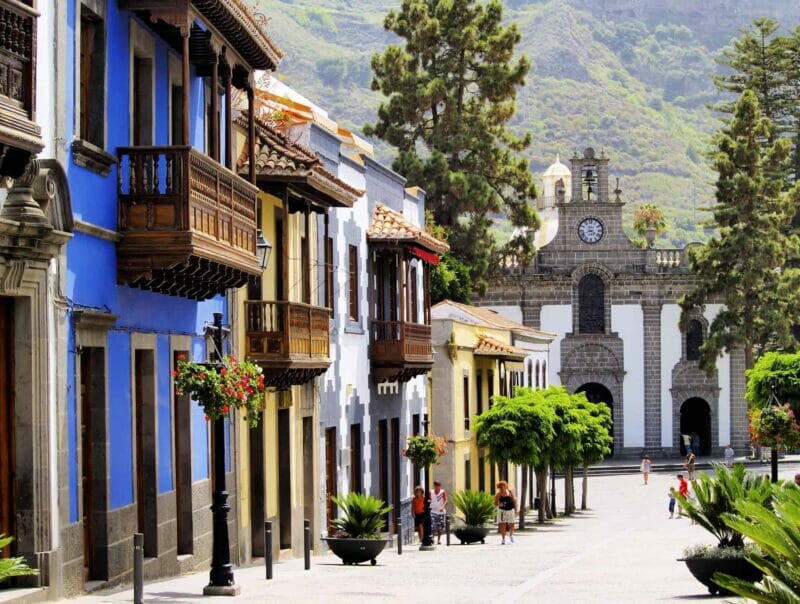
As with most tourist destinations, it’s fair to assume that most of the crime occurs during the busy season. If you’re concerned about the crime rate, living in a rural area will be better.
However, if you’re happy to live in pretty much any British city, the Canary Islands shouldn’t be a big concern.
Living in the Canary Islands: the pros and cons
If you’ve ever been to the Canaries, then you’ll already have a good idea of everything they have to offer.
However, moving there permanently means weighing up both the pros and cons before making a decision.
While none of the drawbacks is major, they’re definitely worth considering before making the jump to island life. Here are the pros and cons of living in the Canary Islands.
The pros of living in the Canary Islands:
1. Plenty of beaches
Perhaps the most obvious advantage of living on an island is the sheer number of beaches.
You’re never too far from one, meaning it’s super easy to arrange an impromptu trip whenever you feel like it. Once you move there, you can spend some time finding the lesser-known gems.
2. Amazing climate
As mentioned, the Canaries rarely have what many would consider cold weather. They benefit from their proximity to Africa and the sea, which results in warm, consistent weather.
You will find microclimates at higher altitudes, so make sure you own at least one sweater!
3. Eating out is inexpensive
If you’ve got consistently great weather to enjoy, then you’ll probably want loads of great restaurants to visit. Well, you’re in luck, as the Canaries have plenty of great (and inexpensive) restaurants.
Obviously, seafood is big here, but there’s no shortage of meat and veggie options too.
4. Travelling is easy
Public transport isn’t expensive, and traveling between islands is super easy. There are plenty of planes and ferries, making day trips a breeze.
Second-hand cars are more expensive than on the mainland.
However, many expats still opt to buy one. Find more information on Spanish driving regulations and the car registration process in our guide, Sorting Out A Car And Driving In Spain.
5. High-class healthcare
The Canary Islands are an autonomous region under Spanish rule, and Spain is known to have high-quality healthcare. This extends to the Canaries, too, particularly places like Tenerife.
If you want access to public healthcare, you’ll need to be a Spanish resident, but the private facilities are also very high quality.
Many expats opt for international health insurance. To make sure you get the best value for money, compare international health insurance options from various providers to find the best deal.
Our guide to Health Insurance In Spain will help you understand how to access the Spanish Public Healthcare system, private health insurance options, and the costs.
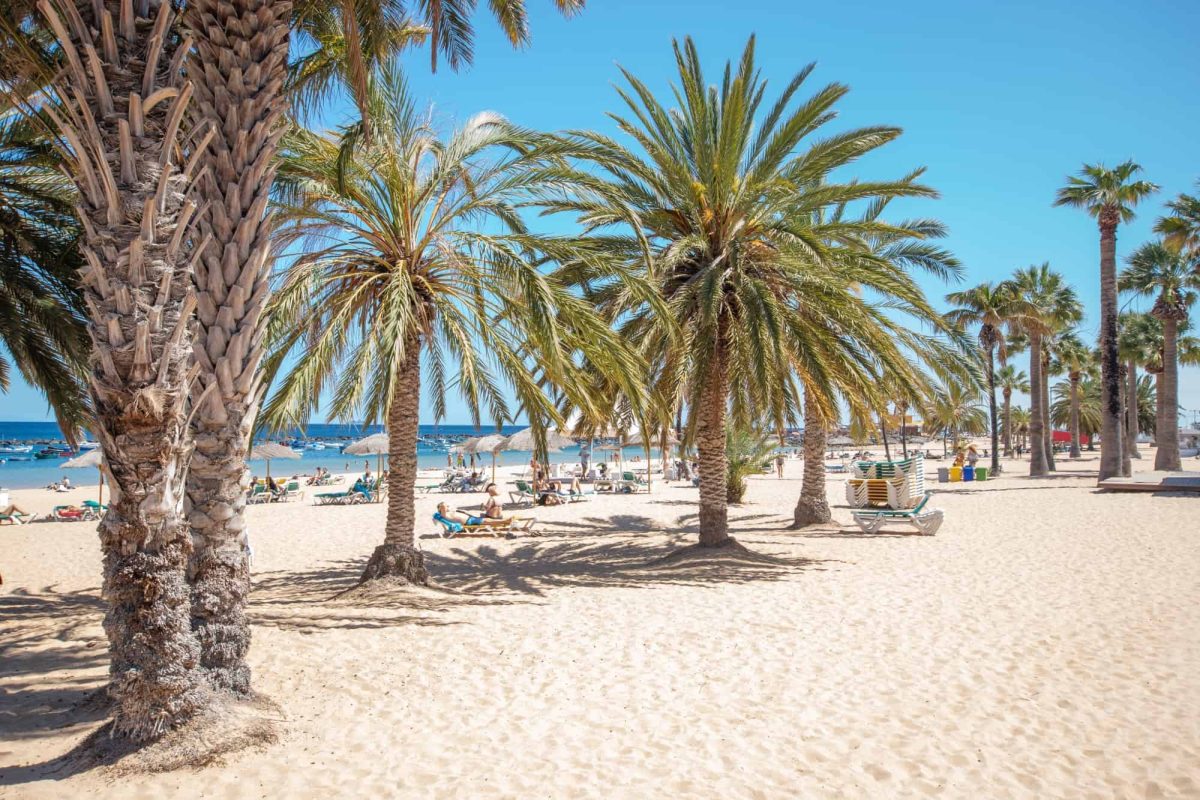
The cons of living in the Canary Islands:
1. Very tourist-heavy
It’s no secret that the Canary Islands are heavy on tourism.
While this isn’t the worst thing ever, it does mean everywhere is very busy in the summer and that many businesses operate on seasonal schedules.
If you’re considering living in the Canary Islands, you’ll have to make your peace with the tourism boom.
2. Island life takes adjustment
It might seem obvious, but living on an island does take some adjustment. It’s not possible to just jump in your car and get away for a weekend like you can while living on the mainland.
After a while, some people might find island life a bit claustrophobic.
3. Slow pace of life
This isn’t necessarily a con but can take some adjustment if you’re coming from a fast-paced country.
There isn’t a concept of “now”; the earliest you’ll probably get something is within a day or so. After a few months, you won’t even notice this as a problem anyway.
4. Not much high culture
Again, this isn’t really a downside, but if you want nightly operas and ballets, the Canary Islands just aren’t for you.
Much of their economy is geared towards tourism, so think bars, restaurants, and the odd nightclub. Concerts do happen, but usually in the summer season, and usually only on the main islands.
Expats living in the Canary Islands
As you’d expect, the Canary Islands have quite a large expat community. Many move there either in retirement or to set up a business focused on tourism.
If you’re considering moving to the Canary Islands, it’s likely you won’t mind being around plenty of expats.
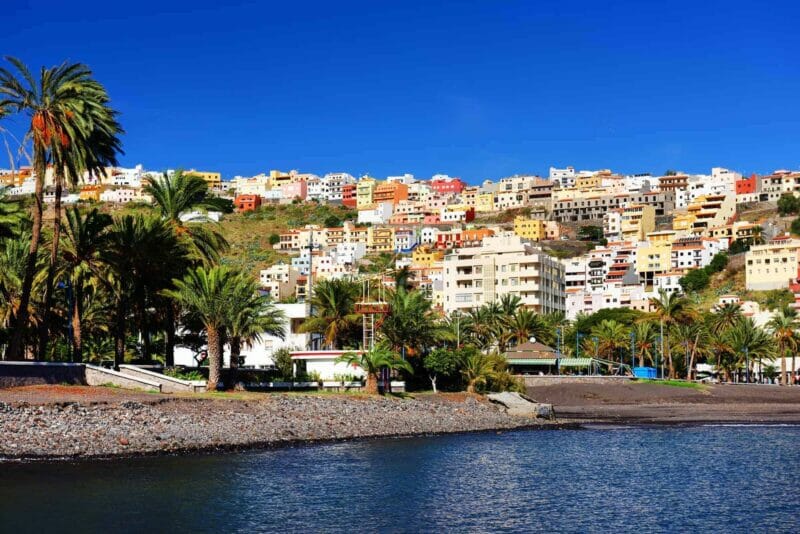
Of course, the major islands like Tenerife, Lanzarote, Gran Canaria, and Fuerteventura are heavier on expat communities.
Smaller islands like El Hierro and La Gomera have smaller expat communities, but you’ll still be able to find people to befriend.
If you want to find out more about expat communities in the Canary Islands before moving, your best bet would be somewhere like Facebook.
There are plenty of expat groups that you can join, and people are usually more than happy to share their stories and tips about making the move.
To get the most authentic Canary Island experience, you’ll want to settle down away from the resort areas. However, tourism is such a big industry that it permeates even into rural towns.
Even if you don’t find a bustling expat community in your chosen area, you shouldn’t have much of a problem making friends with locals, who are usually very welcoming.
Which is the best Canary Island to live on?
Depending on what you actually want from your new life in the Canary Islands, some will be better than others.
The suggestions below are based on the idea that you won’t mind either tourism or large expat populations. After all, if you did, there would be far better places to choose than the Canaries.
The main difference between the bigger islands is how developed and populated they are. If you like the idea of the Canaries but want a quieter life, one of the smaller islands would be a better option.
But here’s a roundup of the best Canary Islands to live on:
Tenerife
Tenerife is the largest and most populous island in the Canaries. It’s also the most highly favored by Brits, among other tourists.
As a result, it has the best connections to the UK and other mainland destinations, making it a good choice if you plan on taking frequent holidays.
Many expat buyers favor the south of the island, particularly near the airport.
Tenerife is also a good choice if you plan to set up your own business, such as a hotel or restaurant because it easily sees the most tourism trade.
Gran Canaria
Gran Canaria is the third-largest island but easily has the most varied terrain.
The resort towns are in the south, but farther north, you’ll find almost tropical forests and lush rolling hills. Its capital, Las Palmas, has a lively food and shopping scene too.
Depending on where you plan to settle down on the island, you can find an apartment for as little as €120,000. But if you’re willing to spend more, you can find some amazing villas for around €500,000.
Fuerteventura
Fuerteventura is still popular with tourists, but it was “discovered” much later than the larger islands.
The biggest difference is that properties are notably cheaper; for example, you could find a central apartment for €65,000 or so.
It doesn’t get as busy as Gran Canaria or Tenerife, but you can still expect a tourism boom in the summer months.
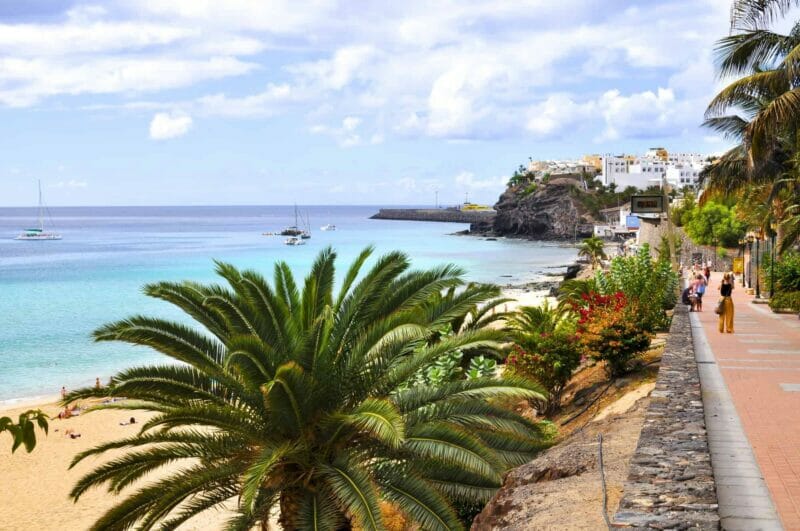
El Hierro
El Hierro is one of the smallest main islands and has a population of around 11,000. It’s the farthest west but still benefits from the same climate as the other islands.
You won’t have any problems with connections because it has an airport, and ferries to the other islands are frequent.
El Hierro is a good choice if you want a quieter life in the Canary Islands and don’t mind traveling for larger shopping trips and days out.
La Gomera
La Gomera is another lesser-known island. It lies just to the east of Tenerife and has a population of roughly 21,000.
It’s famous for its location and wine and also has some amazing wildlife and geography. It would be a good choice for those who want an outdoor lifestyle that isn’t too influenced by tourism.
Is it better to rent or buy in the Canary Islands?
One of the biggest advantages of looking to relocate to a tourist-centered area is that renting property is usually quite easy.
Holiday lets are big business, and this means you can often find a good deal during the winter months.
You could easily rent a property on one of the larger islands for a few months and use this as your base to explore the other islands.
Our guide on Renting A Property In Spain will help you understand the process and avoid possible pitfalls.
In the long term, however, it would make more sense to buy a property in the Canary Islands if you plan on staying there permanently.
The island you choose does matter, but it’s also really easy to hop between islands for day trips. So be sure to settle down on one with everything you need, but don’t overthink it too much.
To avoid mistakes, read our Complete Guide To Buying A Property In Spain before purchasing your home in the sun.
As the Canary Islands are autonomous but under Spanish law, Spanish residency and property rules apply.
Be wary when viewing cheap properties because estate agents often have a habit of skirting over any issues. It’s also worth paying for independent surveys before agreeing to a sale.
A major bonus of buying property in the Canaries is that most estate agents will speak English.
While learning Spanish will help in the long term, it won’t matter as much during the buying process as it might in mainland Spain. However, if you’re concerned, take a translator with you.
In short, there are very few reasons why you would choose renting over buying.
Renting can be helpful when searching for properties, but owning your own home makes much more sense and will obviously offer more security during your residency application process.
Living in the Canary Islands – summary
Living in the Canary Islands offers everything you might be familiar with from past holidays. One of the biggest draws is the great year-round weather, which is complemented by the great scenery and amazing food.
Of course, one of the possible trade-offs is the large tourism industry, but you can use this to your advantage. Setting up a business can be an easy way to generate income.
Either way, it’s likely you don’t mind tourism much if you’re considering the Canary Islands.
Regardless of which island you choose as your new home, the Canaries can be a very relaxing place to set up your new life. The dream is that it’ll simply feel like one big holiday.
Other popular locations in Spain to consider:
- All About Living On The Costa De La Luz, Spain As An Expat
- The Guide To The Spanish Costas For Expats
- Living In Murcia And The Costa Cálida As An Expat
- What’s It Like Living In Mallorca As An Expat
- Living On The Costa Blanca In The Province Of Alicante
You might find useful:
- Living In Spain As An Expat – – the ultimate relocation guide full of practical information and tips on moving to Spain, from the pros and cons to visas and residency, to the cost of living, healthcare, banking, and more.
- Best Places To Live In Spain – the best and most popular expat locations in Spain.
- Didn’t find what you were looking for or need further advice? Comment with your question below, and we will do our best to help.
Helpful external links:
- A list of hospitals in Tenerife with essential information and addresses on the Tenerife Forum site.
- Ferry services between the islands: Fred Olsen, Naviera Armas and Trasmediterranea.
- Discover which Canary island is warmest in winter.
- The Register of Authorized Health Centers in the Autonomous Community of the Canary Islands.



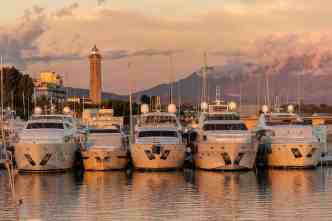
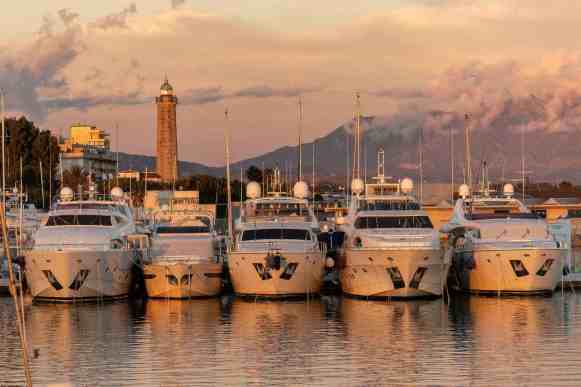
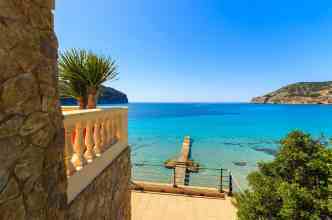
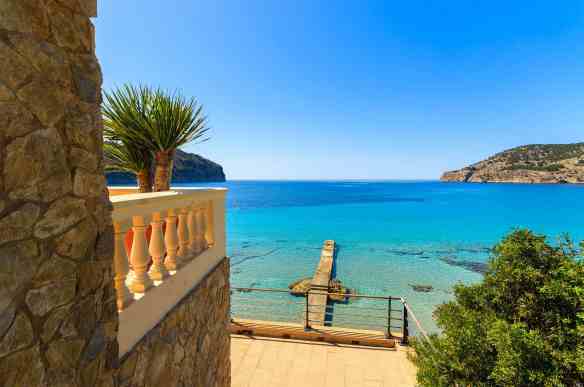
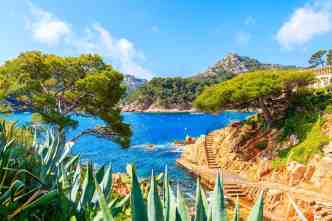
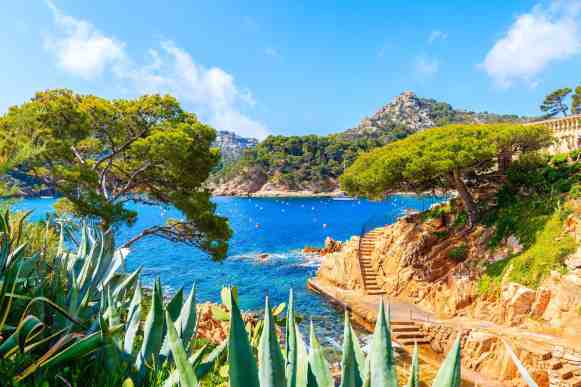
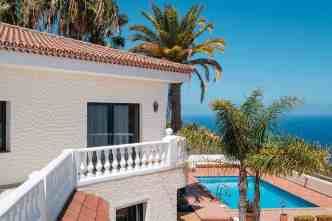
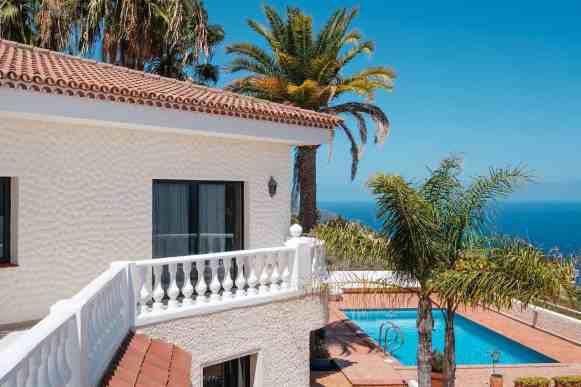
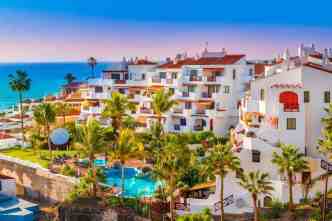
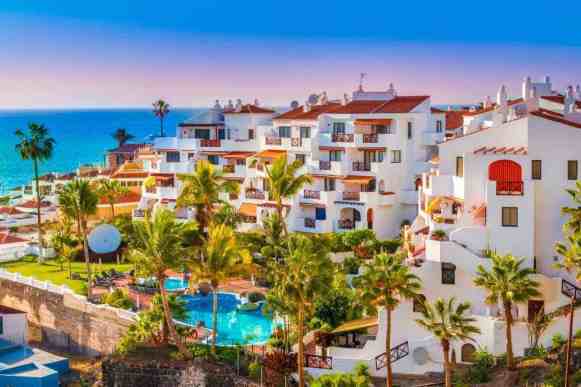


Hi everyone
We are a gay couple living in Malta ages 51 & 60 for the past 9 years till presently we have the only gay club on the island but unfortunately the lease will close this year therefore we are seriously thinking in moving to grand Canaria
We are looking for a 2 bedroom accommodation preferably with a pool
We would be great full if anyone can guide us Thank you
We been for a holiday twice and we loved it
Hi,
Can someone recommend a job website for commercial/account management on the Canary Islands?
Thanks.
Is there chance to find job as an holistic therapist and yoga teacher preferably working with seniors Im EU citizen and be happy to relocate on Canary island
Hi Kristina, it’s totally possible and easy for you being an EU citizen. You can either be self-employed and run your own business or look for employment in various retreats and resorts. Here’s an example: https://www.surf-jobs.com/job/yoga-teacher-on-fuerteventura/
Good luck
Thanks 🙂
I was based in Las Palmas and the south of Tenerife for 1.5 years from January 2021 to June on this year. I was only on Gran Canaria for a few months so I can’t comment definitively about life there socially as an xpat.
However I spent a full year living in Costa Silencio in the south of Tenerife and was climbing the wall ‘la muralla’ to finally get out and head back to civilization on the peninsula.
The quality of the local Canarians and European xpats in terms of education and worldly knowledge is shockingly low in the south of Tenerife where the majority of particularly the English are big Trump supporters not surprisingly! In short I didn’t have a good time there at all and got assaulted and robbed by a group of teenagers on the way home after watching a football match in neighbouring Las Galletas!
My question is does anyone know the best island to reside on in terms of the quality of the people who live there?
I’ve been thinking about Fuerteventura this Christmas but I wouldn’t want to have the same problems there that I had in Tenerife.
Thanks for any info anyone can provide.
@Jay, Sounds to me as if you did not do proper research prior to moving down south. Smart that you are attempting to do so now. I am certain no one was distraught when you “climbed” out of there….
I would be interested to hear a bit more about how will the proposed law (July 2022), Mr Sanchez (the current president) proposed a few months ago, aimed to be deployed during the state of alarm (Covid 19 from 15/03/2020 to 30/06/2020 was one such event) whereby citizens’ private property may be ceased for public use. This means that my private property, namely my house could be taken by some civil servant and I would become broke and homeless since my only home is in Spain.
I would be interested to hear more about this and how would people like me, and there are many such people who likely do not even know this is “in the pipeline”, be affected by it.
Hi Alex, I have contacted our Spain expert Maria Luisa de Castro, the founder of Costaluz Lawyers (https://expatra.com/author/marialdecastro/) and asked her to comment on your query. This is what she had to say,” There is a national safety law which includes some of these measures. I very much doubt this Law will be approved and if so, will be most likely challenged as unconstitutional by the PP party”.
Hope this helps
I disagree with you on the culture field, you ”expats” always end up living close to tourist areas or nearby other english speaking people where, you’ll find few locals and local activities. We do have lots of events in the capital area and I almost never see foreigners attend to those events. Of course we don’t have major plays or concerts like big cities that often (as I’m sure smaller uk towns don’t have either) but there’s a very lively and large cultural life if you want to enjoy it, other thing is you expect this offer in english, which is not the case. And please, stop using the term expat, you are as inmigrant as someone coming from South America, Rusia or Australia same I’d be if I moved to UK or any other country.
@Jen, Heya! My wife and I want to migrate to (possibly) gran canaria, you mentioned lively local communities that might be fun to be apart of are there dancing communties etc? and what are local activities/festivities/events like? any reponse would be appreciated.
P.S. we would learn spanish before coming and once we had moved to Gran Canaria
Hi Marcus,
The best way to get the answers to your questions is to join a FB group Gran Canaria Expat Community. There you will find all the activities and events and who knows maybe even future friends.
Good luck,
Hi. I loved your article about the Canary Islands. Can I immigrate there with pets? Thanks!
Hi Susan, here you can find all the info about bringing your pets to the islands: https://www.pettravel.com/passportnew.cfm Just type the country you are interested in in the search bar.
Hi all. Are you German, Danish, British? Do you have a powerful personal story about you coming to live in Gran Canaria and you want to share it for a documentary film?
We are currently looking for people 30 years old and older who wants to share their story in a documentary film for the Danish TV that will explore the difficulties and rewards, ups and downs, light and darks of having left your home country and chose to come Gran Canaria for a big life changing experience.
If you think your personal story might help other people reflect about the challenges of migrating and want to share it, please contact us at rodrigo@macaronesiafilms.com for more info. We’d appreciate that you share this offer with other people that might as well be interested.
I currently live in Tenerife. Moved here from Chicago. This analysis is still very helpful. Thank you!
How did you decide where to live in the Canary Islands?
@Jie, same question as Derek. Moving to the Canary Islands from Charlotte, NC with a young family.
Why no mention of Lanzarote when talking about which island maybe best to live on?
Personally Lanzarote is my favourite for many reasons, shame it was overlooked!
Excellent article, very informative, thank you.
Thank you this has been helpful
I’m interested in a life in the Canarias
Than you x very helpful mate